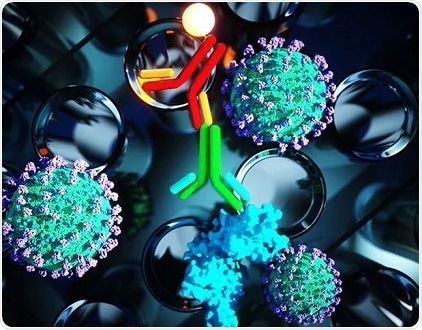The development of new assays that can detect the presence of the novel coronavirus (SARS-CoV-2) in patient samples or proof of recent infection has become quintessential with the recent and fast spread of the virus.
One approach under development is various assays to determine the occurrence of anti-SARS-CoV-2 antibodies in the serum of patients.
Bethyl’s SARS-CoV-2 ELISA
The SARS-CoV-2 ELISA from Bethyl Laboratories identifies antibodies against the SARS-CoV-2 Spike protein’s (S1-RBD) receptor binding domain (RBD) in the serum of patients recently infected with the virus. The virus enters into human cells via the ACE2 receptor with the help of the S1-RBD.

Figure 1. Defeating COVID-19: The Science Behind a New ELISA for COVID-19 Seroconversion Detection. Image Credit: Bethyl Laboratories Inc.
Although the SARS-CoV-2 virus is similar to the SARS-CoV virus, which led to the SARS outbreak in 2003, in certain ways, the SARS-CoV-2 Spike protein is evolutionarily different.1 By contrast, the SARS-CoV-2 Spike protein shares a 97.7% identity with that of the bat coronavirus from which it evolved.
The S1-RBD receptor binding domain varies from that of the SARS-CoV Spike protein and various bat coronaviruses, with several amino acid replacements and insertions.
Thanks to the peculiarity of S1-RBD, it is a valuable target for this ELISA as there are no chances of cross-reaction of antibodies against other viruses and more common coronaviruses with this antigen. Considering the comparative sequence homology between SARS-CoV and SARS-CoV-2, immune cross-reactivity could be anticipated.
Detecting immune response to SARS-CoV-2
It has been proposed that the SARS-CoV-2 Spike (S) protein is one of the most immunogenic of its proteins, which makes it an ideal candidate for an ELISA to identify an immune response to SARS-CoV-2.
This postulation is founded on studies on patients infected with the associated virus, SARS-CoV, indicating that antibodies against portions of the S protein could be identified in all patients analyzed in the study.2
These antibodies existed for at least 30 weeks after the disease onset. Antibodies against S1-RBD are neutralizing antibodies that act against the entry of the virus into human cells In the case of SARS-CoV-2. This is because these antibodies struggle for ACE2 binding to the virus.3
The SARS-CoV-2 S protein is a superior choice of antigen compared to the nucleocapsid (N) protein for ELISAs.
A head-to-head comparison of ELISAs using the N or S protein as capture showed that the ELISA using the S protein was more sensitive than the one that involves the use of the N protein, for detecting IgM antibodies.4 There was no major difference between the use of either protein for IgG detection.
When compared to the use of a lateral flow immunoassay, used commonly for clinical diagnostics because of the speed at which it can be conducted, the use of an ELISA to identify SARS-CoV-2 antibodies is a superior choice. Between the two assays, ELISA is the more sensitive one.
Recently, a study assessed commercial lateral flow immunoassays versus ELISAs against the SARS-CoV-2 Spike protein and demonstrated that lateral flow assays are not ideal as diagnostic tools due to the low sensitivity of all nine lateral flow assays evaluated for IgG, IgM and total antibodies.
On the other hand, ELISA proved reliable in the detection of anti-S IgM and IgG antibodies from patient samples, for at least 60 days after the onset of COVID-19 symptoms.5
Serologic assays, such as ELISAs against S1-RBD, play a role in the future of monitoring the spread of SARS-CoV-2 and gaining better insights into immunity in the combat against COVID-19.
References
- Ortega JT, Serrano ML, Pujol FH, Rangel HR (2020) Role of changes in SARS-CoV-2 spike protein in the interaction with the human ACE2 receptor: An in silico analysis. EXCLI Journal; 19:Doc410; ISSN 1611–2156. https://doi.org/10.17179/EXCLI2020-1167.
- Qiu M, Shi Y, Guo Z, Chen Z, He R, Chen R, Zhou D, Dai E, Wang X, Si B, Song Y, Li J, Yang L, Wang J, Wang H, Pang X, Zhai J, Du Z, Liu Y, Zhang Y, Li L, Wang J, Sun B, Yang R (2005) Antibody responses to individual proteins of SARS coronavirus and their neutralization activities. Microbes and Infection 7:882–889. https://doi.org/10.1016/j.micinf.2005.02.006.
- Ju, B, Zhang, Q, Ge, X, Wang, R, Yu, J, Shan, S, Zhou, B, Song, S, Tang, X, Yu, J, Ge, J, Lan, J, Yuan, J, Wang, H, Zhao, J, Zhang, S, Wang, Y, Shi, X, Liu, L, … Zhang, L (2020). Potent human neutralizing antibodies elicited by SARS-CoV-2 infection. Cold Spring Harbor Laboratory. https://doi.org/10.1101/2020.03.21.990770.
- Liu W, Liu L, Kou G, Zheng Y, Ding Y, Ni W, Wang Q, Tan L, Wu W, Tang S, Xiong Z, Zheng S (2020) Evaluation of Nucleocapsid and Spike Protein-based ELISAs for detecting antibodies against SARS-CoV-2. Journal of Clinical Microbiology. https://doi.org/10.1128/jcm.00461-20.
- Adams ER, Ainsworth M, Anand R, Andersson MI, Auckland K, Baillie JK, … Whitehouse J (2020) Antibody testing for COVID-19: A report from the National COVID Scientific Advisory Panel. medRxiv. https://doi.org/10.1101/2020.04.15.20066407.
About Bethyl Laboratories, Inc.

Bethyl Laboratories, Inc. has been dedicated to improving lives by supporting scientific discovery through its qualified antibody products and custom polyclonal services since its founding in 1972. Bethyl has a global reputation for quality, consistency and first-class customer care. Every antibody that Bethyl sells is manufactured to exacting standards in Montgomery, Texas, and is validated in-house by a team of scientists. From the veterinary facilities to the development, production, and validation labs, the entire Bethyl team focuses on delivering quality products and delighting customers.
Bethyl Laboratories has been acquired by Fortis Life Sciences. To learn more visit: https://promotions.bethyl.com/news/fortis-life-sciences-acquires-bethyl-laboratories/.
Sponsored Content Policy: News-Medical.net publishes articles and related content that may be derived from sources where we have existing commercial relationships, provided such content adds value to the core editorial ethos of News-Medical.Net which is to educate and inform site visitors interested in medical research, science, medical devices and treatments.